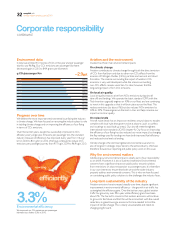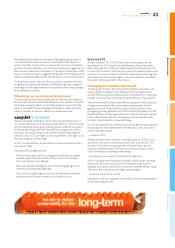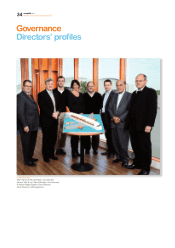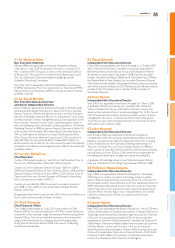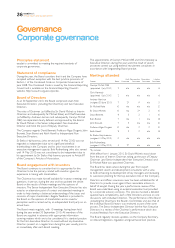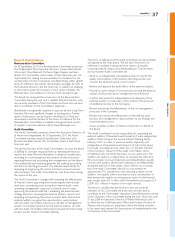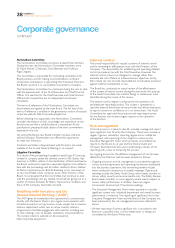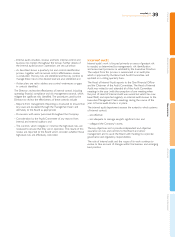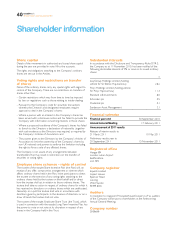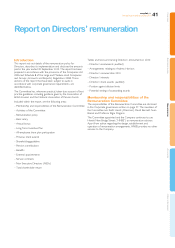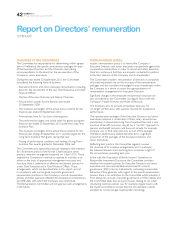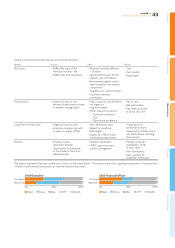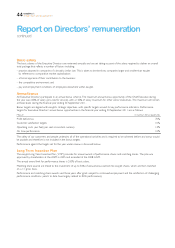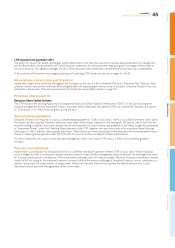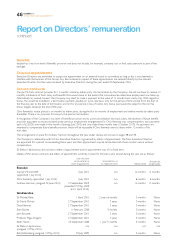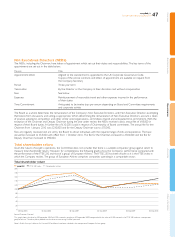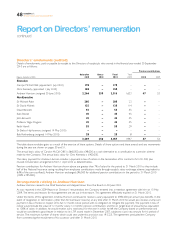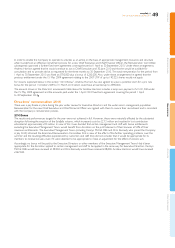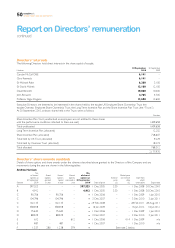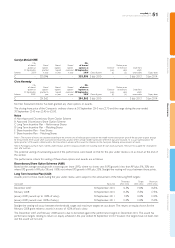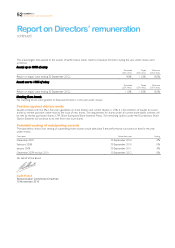EasyJet 2010 Annual Report Download - page 44
Download and view the complete annual report
Please find page 44 of the 2010 EasyJet annual report below. You can navigate through the pages in the report by either clicking on the pages listed below, or by using the keyword search tool below to find specific information within the annual report.easyJet plc
Annual report and accounts 2010
Report on Directors’ remuneration
continued
42
Activities of the Committee
The Committee has responsibility for determining, within agreed
terms of reference, the specific remuneration packages for each
of the Executive Directors and the Chairman and making
recommendations to the Board on the remuneration of the
Company’s senior executives.
During the year ended 30 September 2010, the Committee
considered the following items of business:
–Executive Director and senior executive remuneration, including
those for the recruitment of the new Chief Executive and Chief
Financial Officer;
–The fee of the new Chairman and Deputy Chairman;
–Annual bonus awards for the financial year ended
30 September 2009;
–The structure and targets of the annual bonus scheme for the
financial year ended 30 September 2010;
– All-employee Save As You Earn scheme grants;
– The performance targets and award levels for grants during the
financial year ended 30 September 2010 under the Long Term
Incentive Plan;
–The structure and targets of the annual bonus scheme for the
financial year ending 30 September 2011 and the targets for the
Long Term Incentive Plan grants during that year;
–Testing of performance conditions and vesting of Long Term
Incentive Plan awards granted in December 2006; and
The Committee also approved proposals relating to the retention
for a fixed-term period of the former Chief Executive when
previous retention arrangements expired on 1 April 2010. These
enabled the Company to continue to operate its activities as an
airline on the basis of appropriate management resources and
structure while it undertook an effective recruitment process for
a new Chief Executive and a Chief Financial Officer. These
arrangements, which are described later in this report, are not
in compliance with normal good corporate governance
remuneration practices or the Company’s normal remuneration
policies and their approval reflected the exceptional circumstances
and difficulties with which the Company was confronted.
The Remuneration Committee will not approve such arrangements
in the future.
Remuneration policy
easyJet’s remuneration policy is to reward the Company’s
Executive Directors and senior executives competitively against the
comparative market place, in order to recruit and retain Executive
Directors and ensure that they are properly motivated to perform
in the best interests of the Company and its shareholders.
The Committee considers remuneration of directors in companies
of broadly equivalent size on the structure of the remuneration
packages and also considers the budget for pay of employees within
the Company as a whole, to assess the appropriateness of
remuneration arrangements for Executive Directors.
Significant changes in the employee remuneration structure are
also considered by the Committee (via regular liaison with the
Company’s People Director and Head of Reward).
The Company aims to provide competitive ‘total pay’ for
‘on target’ performance, with superior rewards for exceptional
performance.
The remuneration packages of the Executive Directors and senior
executives comprise a combination of basic salary, annual bonus,
participation in share-based Long Term Incentive Plans and a very
low level of benefits provision. easyJet has a “no frills” approach to
pension and benefit provision and does not include, for example,
company cars or final salary pensions as part of the package.
Therefore, performance related elements form a significant
proportion of the packages of the Executive Directors and
senior executives.
Reflecting best practice, the Committee regularly reviews
the structure of its incentive arrangements and, in particular,
the balance between short and long-term incentives in light of
the circumstances prevailing each year.
In line with the Association of British Insurers’ Guidelines on
Responsible Investment Disclosure, the Committee considers
whether the incentive policies for Executive Directors and senior
executives will raise unacceptable environmental, social or
governance (‘ESG’) risks by inadvertently motivating irresponsible
behaviour. More generally, with regard to the overall remuneration
policies, there is no restriction on the Committee which prevents it
from taking into account corporate governance on ESG matters and
the Committee takes due account of issues relating to risk when
structuring incentive policies (via, for example, regular liaison with
the Audit Committee to ensure that the remuneration policies
adopted do not encourage inappropriate risk-taking).


